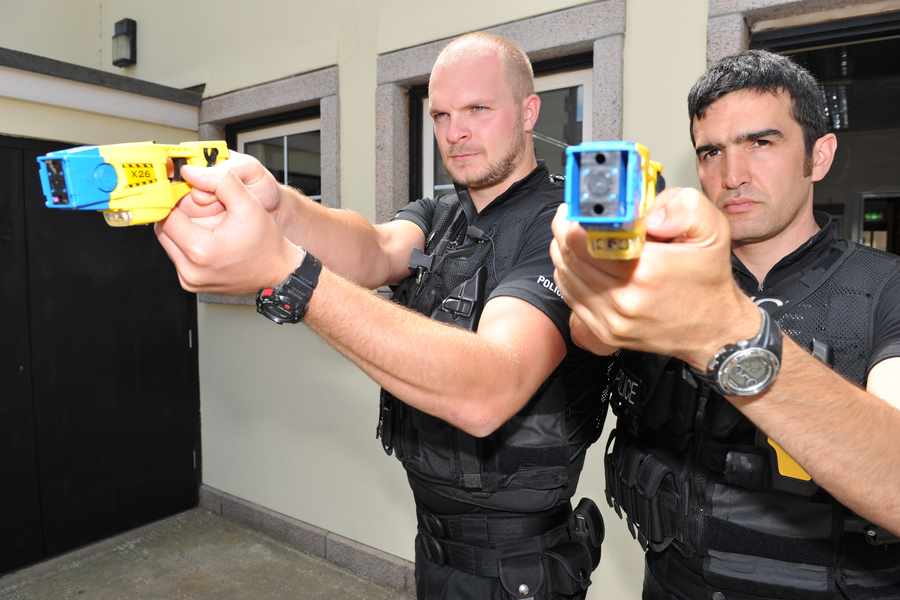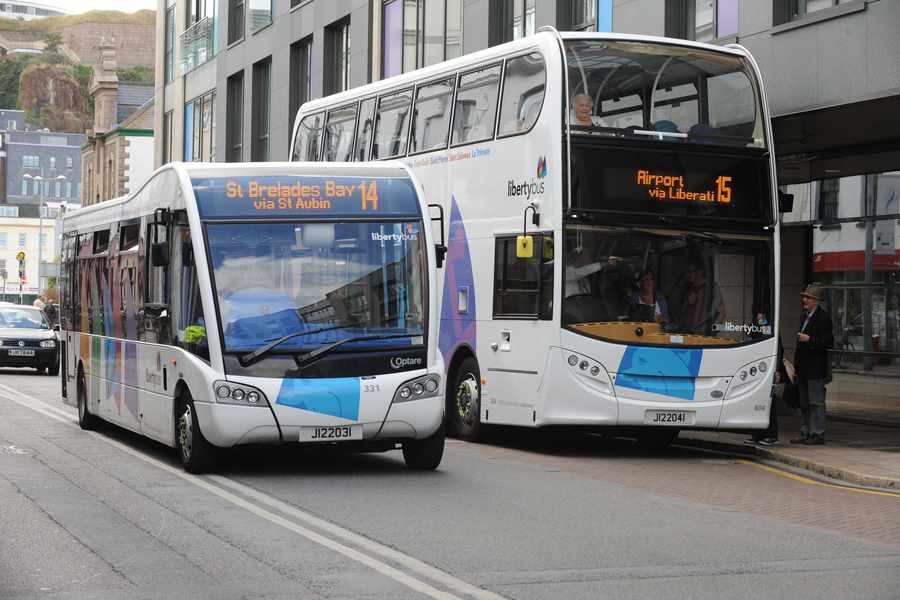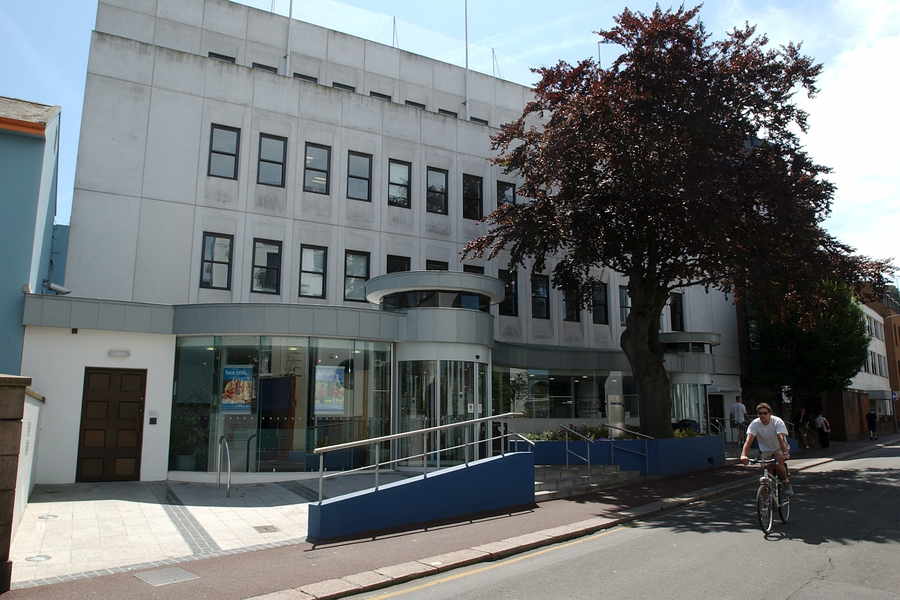Home Affairs Minister Kristina Moore said the actions of armed police in stopping the men, in two separate incidents on 8 February, was ‘absolutely appropriate’ because they were acting on a threat to kill officers in Jersey.
Armed officers had been deployed throughout Sunday, 8 February, and the inquiry desk at the force’s headquarters at Rouge Boullion was closed while the threat was investigated.
In the first incident, a man was wrestled to the ground near Charing Cross by officers, one of whom was armed with a Taser, who informally questioned him but made no arrest.
Later the same day, Ross Barker, a student, was stopped in his car on his way to visit a friend’s estate near La Moye Prison by armed officers.
At the time, he said the police told him his car had matched the description of another they thought gunshots had been fired from.
Mr Barker, who was shocked but unharmed, later praised the police for their ‘better safe than sorry’ approach.
During States question time, St Helier Deputy Mike Higgins asked the minister whether the police had acted correctly and proportionately, and whether any lessons, if any, had been learnt.
Deputy Moore replied: ‘The States of Jersey Police were dealing with a threat to the lives of police officers based on intelligence received from a third party.
‘The firearms response was led by a senior officer specifically trained and experienced in the command of situations which require the deployment of armed officers.
‘Two members of the public were stopped by armed police as part of the operation.
They were both safely detained in accordance with national guidelines for the deployment of armed officers and immediately released unharmed when it was established that they did not pose any threat.
‘This firearms operation was successfully concluded later the same day when a suspect was detained and arrested by armed officers.’
In a supplementary question, Deputy Higgins, said: ‘One was forced to the ground and another detained in his car. Is it proportionate for a member of the public to be thrown to the ground?’
Deputy Moore said she believed it was absolutely appropriate and added: ‘These were textbook stops and the commanding officer is considering using this as an example of best practice when training new staff.’

POLICE officers in Jersey will be armed with Tasers within weeks of finishing their training, it was announced by the force last year.
Seven of the Island’s firearms officers completed a three-day training course last July, and three others had already received the training, which was led by the City of London Police.
The introduction of Tasers was approved by the States in 2013 following an in-depth review by a Scrutiny panel.
Sergeant Dean Machin, head of the States Police firearms department, said that the devices would provide a link for officers as they ‘bridge the gap between the baton and the bullet’.
‘It gives us the opportunity to fully establish our firearms strategy, which is to minimise risk to the public, the subject and even the target, and to maximise safety for the subject. The Taser is the last piece of the jigsaw,’ he said.
PC Simon Ashton, a firearms officer from the City of London who led the course at the TA Centre at Mount Bingham, said: ‘The options currently available limit the officers’ response, which means that they are more likely to use a gun against an assailant with a knife. No officer goes to work and wants to pull the trigger on a gun – it’s a life-changing decision.’
ALL bus fares should be reduced regardless of the method of payment, according to St Helier Constable Simon Crowcroft.

During Question Time on Tuesday, Deputy Geoff Southern asked Transport Minister Eddie Noel to give Members details of the number of people using buses, including the number of Islanders using pre-paid cards rather than cash.
The question comes after it was announced that bus fares will rise next month by 20p for cash-paying customers to encourage more people to use the top-up card system, which Deputy Noel believes is a more ‘convenient’ way of paying to travel.
He said that more than half of Islanders using the bus service last year paid by cash, 36 per cent used pre-paid cards and eight per cent have AvanchiCard Unlimited cards.
But Mr Crowcroft said that he believed fares should be reduced overall in order to encourage people to move away from using cars.
However, Deputy Noel said that the purpose of the increase was to change people’s behaviour and steer them away from using cash to pay for their bus journey and use the card system instead.
And he said that by using the top-up cards, Islanders will see a reduction in costs to travel, with a weekly unlimited pass decreasing from £19.50 to £15 and a monthly pass reduced by £49 to £45.
He said that the department was working on introducing a single flat fare across the Island and hopes that this will be in place by next year.
The new pricing structure will be in place from 1 March, increasing the cost of a journey from town to the Airport from £1.80 to £2 for cash fares, while passengers who use a ore-paid AvanchiCard will pay £1.60.
ALTHOUGH we may not have quite yet reached the point of Jersey’s roads reaching maximum capacity, it can certainly feel that way at times, which is why we are constantly being encouraged to ditch the car in favour of the bus.
However, it has today been announced that bus fares are to rise. Journeys paid for in cash are to rise by 20p from next month in a bid by Liberty Bus to get more people to sign up to its pre-paid travel card system, the cost of which will be reduced. The company, which took over Jersey’s bus service in 2013, said the fares for band A trips (shorter journeys) for people paying with cash will go up from £1.30 to £1.50, while fare band B will increase from £1.80 to £2. Children and students who pay with cash will also pay more, from 80p to £1 per journey.
While the commercial incentives behind the scheme are plainly obvious, is it right that the occasional user or visiting tourist is made to pay more? A recent survey of bus users called for an Island-wide, flat fare, but any such fare, it seems, will only be available to those signed up to the pre-paid subscription cards.
However, regular car drivers, which the States no doubt wants to tempt out of their vehicles and on to the buses, are now faced with either committing to a long-term spending plan or paying an increased, one-off bus fare. Surely there are better incentives?
Of equal concern is the question of whether it is appropriate to propose an increase in bus fares when the price of fuel has dropped so much in recent months. Fuel suppliers, energy companies, airlines and ferry firms around the UK are reducing their prices, sometimes on an almost monthly basis. As this newspaper has already said on a number of occasions, companies in Jersey seem slow to pass on savings here for some reason and now, it seems, we must be one of the few communities in the British Isles facing a proposed rise in bus fares.
There are bodies out there who represent Islanders, from the Consumer Council and the CICRA to the various Scrutiny panels and the States itself; but how many of them are really ensuring that we are getting an appropriate and fair deal?

THE system for dealing with appeals against the removal of benefits from jobseekers who do not look for work hard enough has been defended by the Social Security Minister.

Deputy Susie Pinel said that the majority of appeals dealt with by the department were resolved within the seven day target.
Weekly rates of Income Support (from 7 April 2014)
- £92.12 – Adult
- £132.51 – Single parent
- £63.98 – Child
- £51.31 – Household (if you rent or own your home)
If you have savings above these levels, you’ll receive less benefit.
- £13,706 – Single adult with personal care element
- £9,137 – Other single adult under pensionable age
- £22,718 – Couple (at least one with personal care element)
- £15,145 – Other couple under pensionable age
- £13,706 – Single adult over pensionable age
- £22,7180 – Couple over pensionable age
Appeals that are taken further are then dealt with by an independent tribunal run by the Judicial Greffe and her department endeavours to provide the necessary paperwork within two weeks or three weeks in complex cases, she added.
Her comments followed concerns from Deputy Geoff Southern that some appeals were taking many months to be resolved, often leaving people without any money to live off.
Deputy Pinel said the tribunal was not connected to her department and said that jobseekers were given repeated warnings if they were flouting the rules before their benefits were stopped.
It comes after figures showed that 101 jobseekers had had their benefits stopped for six weeks last year for failing to meet the department’s standards on looking for work, such as by failing to attend interviews or training.
Social Security advises: If the Income Support rules expect you to look for work, you must do so. This includes participating in training or work experience that has been arranged for you, attending interviews and taking up any suitable work that is offered to you.
If you don’t, Social Security officers have the power to:
• reduce or stop your Income Support payments
• reduce or stop Income Support payments to your entire household, including payments for rent and special payments
• prevent people who leave work without a good reason from claiming the adult component of Income Support
Scrutineer: Christine Herbert keeps an eye on the States

IT always adds to the buzz of excitement to have visitors in the public gallery of the States Chamber.
However, after a sizzling start on the subject of cyber-bullying and revenge porn, the Year 8 students from Jersey College for Girls were destined for an uncomfortable morning in the confines of the all-too-small upstairs seats (I always have to sit sideways to accommodate my knees).
Nevertheless, the girls were witness to several historic moments, not least the shortest-ever answer to an oral question.
Deputy Graham Truscott asked about the Island being blacklisted by UK Labour Party leader Ed Miliband. Assistant Chief Minister Philip Ozouf answered. And that was it. No supplementaries, no one jumping up and down, no red lights, no fingers on the buzzers. All rather odd.
32 – Number of OECD member countries that would be blacklisted under Labour leader Ed Miliband’s plans to create a public register of beneficial ownership.
2 – Innocent members of the public stopped by armed police during an operation earlier this month.
110 – Number of JCG girls in the public gallery throughout the day.
18 – Number of Gigabit workers that have been removed from the Gigabit project pending disciplinary procedures.
36 – Percentage of bus journeys paid for using pre-paid Avanchi card.
It wasn’t until Question 8 on the order paper – which also happened to be about the UK Labour Party, and was again answered by Assistant Minister Ozouf – that the penny dropped. Had these questions been asked specifically to enable Senator Ozouf to impart some vital information? Wax lyrical he certainly did – about attending the Labour Party conference, assuring the Assembly how hard he was working in London on the Island’s behalf, that he had actually met the adviser to Ed Miliband, that it was ‘most unfortunate’ that Mr Miliband had made these comments just before an election and that a letter – circulated to Members – had been duly written.
The performance was shattered by St Helier Constable Simon Crowcroft.
Did the Senator not feel shame that this very letter was ‘marred by errors of punctuation that even Year 8 students would not have made’?
Cutbacks in the Chief Minister’s Department, replied the Senator.
Eight States Members were missing at the start of Tuesday’s States sitting:
- Senator Lyndon Farnham, Constable Mike Paddock and Deputies Russell Labey and David Johnson were absent without excuse. All arrived shortly after the roll call was taken.
- Deputies John Le Fondré and Kevin Lewis were absent on States business.
- Deputy Montfort Tadier was excused to attend a funeral and Deputy Louise Doublet was ill.
- The Bailiff William Bailhache was presiding.
But didn’t the Constable agree that the letter had been ‘brilliantly crafted’, in terms of content? Oh, and while in Africa he had also met Mr (Tony?) Blair.
The members of Reform Jersey couldn’t resist. Deputy Geoff Southern mentioned something about the ‘seeding of questions’, and Deputy Sam Mézec said that if the minister was so keen on promoting economic growth around the world, perhaps he could arrange some for the Island, too.
It was quite a relief to get back to policing, the fortnightly update on the goings-on at JT subsidiary Gigabit Field Force and the cost of bus fares.
As the JCG girls prepared to take their leave, the Bailiff, William Bailhache, who was presiding, put things into perspective. They had, he said, heard a series of questions about ‘really important issues’ that concerned their futures – a moment they should carry with them in their hearts when they were eligible to vote.
A magic moment, no doubt.
‘The Deputy is being very cynical and miserable this morning.’ Treasury Minister Alan Maclean responds to Deputy Mike Higgins following his repeated questions about the Jersey International Finance Centre
‘I am an accountant not a magician.’ Transport Minister Eddie Noel responding to Deputy Geoff Southern about bus fare charges and the number of people using the service
‘There are lies, damned lies, and statistics.’ Treasury Minister Alan Maclean, responding to Deputy Geoff Southern’s assertion that GDP has fallen by 13% since 2008






